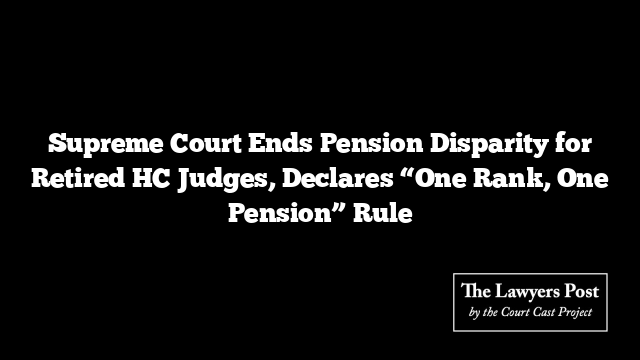In a judgment that redefines how dignity follows a judge beyond the bench, the Supreme Court has declared that every retired High Court judge — regardless of how or when they were appointed — must receive the same pension benefits. The decision anchors itself on the principle of “one rank, one pension” and wipes out the historic distinction based on source of entry, term served, or whether the judge came from the Bar or judiciary.
The ruling wasn’t just a clarification — it was a reset. The Court firmly declared that “discrimination ends here.” Whether a judge rose from the ranks of the district courts or was plucked from practice at the Bar, whether they served for a decade or a day beyond a qualifying threshold — makes no difference anymore.
Delivering the verdict, the bench led by Chief Justice of India BR Gavai, along with Justices AG Masih and K Vinod Chandran, issued a string of directions that leave little room for ambiguity:
- Retired Chief Justices of High Courts will now receive ₹15 lakh annually as pension.
- All other retired High Court judges — including Additional Judges — will receive ₹13.5 lakh per annum.
- No retired judge will be denied full pension due to prior service breaks or changes in pension schemes like NPS.
- States are directed to return the personal contributions of retired judges who were part of the NPS, including accrued dividends, while retaining their own matching shares.
- Family pension and gratuity are to be paid to the families of judges who died in service, irrespective of tenure or whether they were permanent or additional judges.
- Full benefits under the 1954 High Court Judges (Salaries and Conditions of Service) Act — including leave encashment, commutation, provident fund, and other allowances — are to be uniformly applied.
The verdict came in a suo motu case dealing with retiral benefits for judges and considered additional petitions filed by former High Court judges.
CJI Gavai’s words echoed a constitutional ethic as much as a legal directive: “Once a judge steps into constitutional office, the dignity of that office must follow them into retirement. Equality in pension isn’t generosity. It’s justice.”
The Court emphasized that protecting judges’ post-retirement financial security isn’t a bureaucratic formality — it is foundational to judicial independence.
A judicial gavel, long silent on this imbalance, has finally struck.




